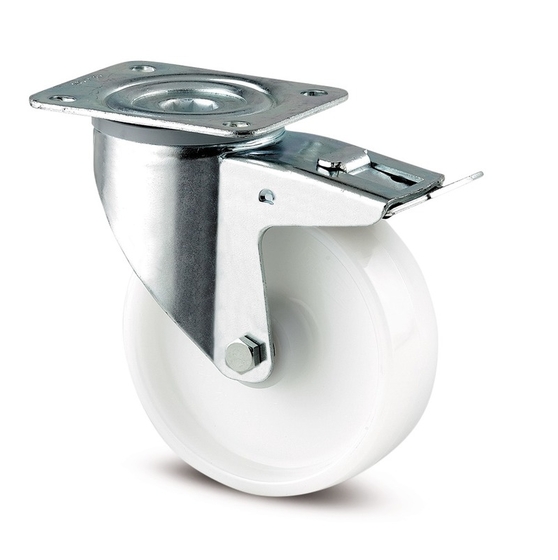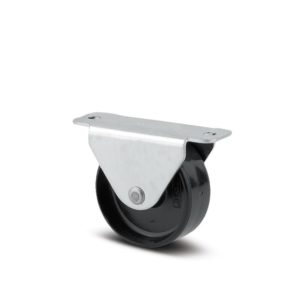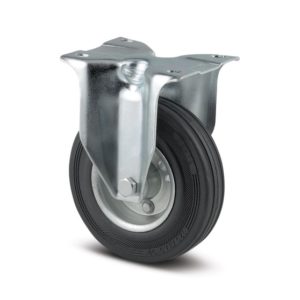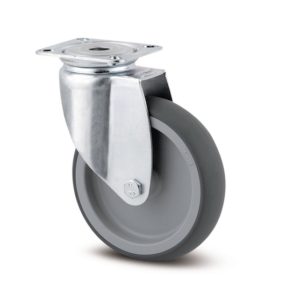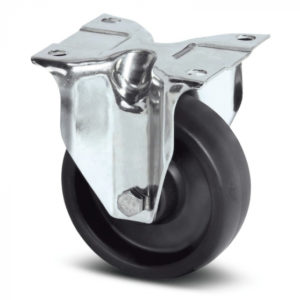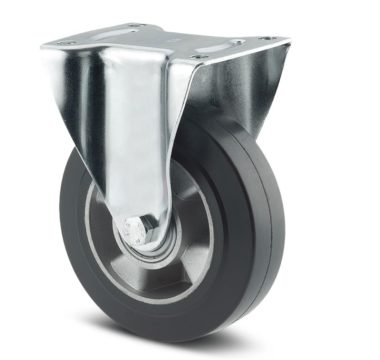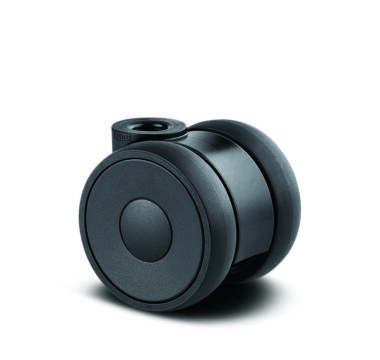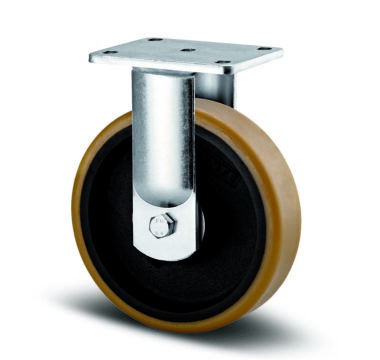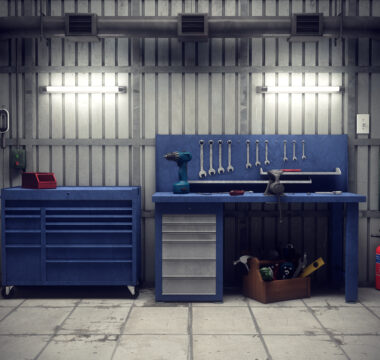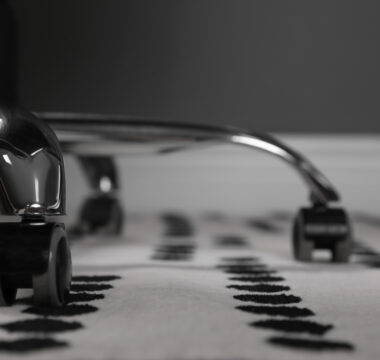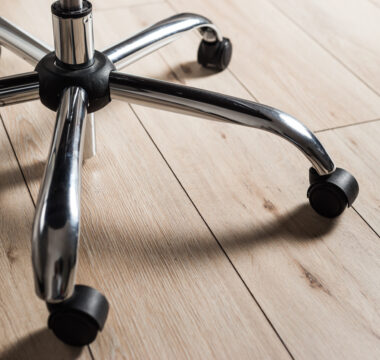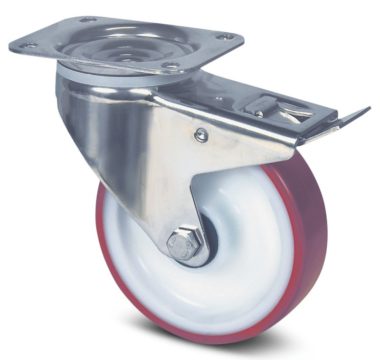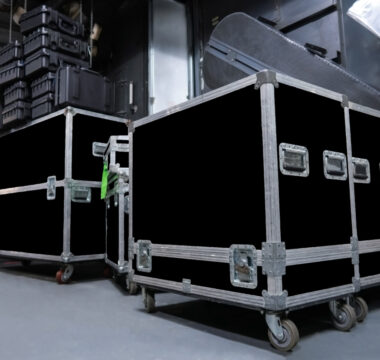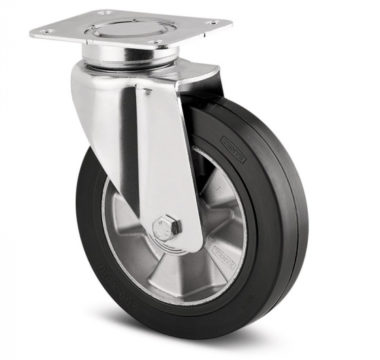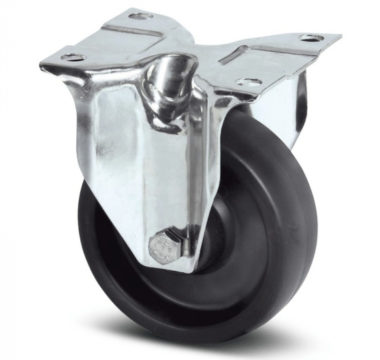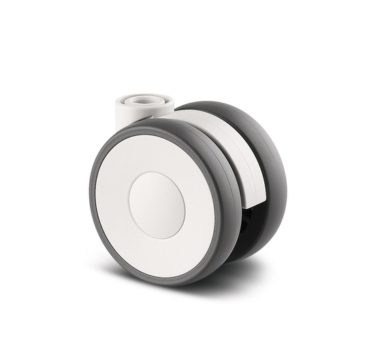There are many different types of castor – each has a specific purpose, and each one is intended for different applications. Understanding the different types of castor wheels and their purposes can help you in choosing the right one for your specific needs.
A castor is a wheel and mount combination. They help you move laundry carts, flight cases, dollies, and other equipment around by providing support and making manoeuvring simple. They’re available in a variety of materials, sizes, tread widths, load ratings, and overall heights to allow your applications to navigate various working environments.
When choosing the right castor for your specific application and environment, you need to consider the following:
- What will the castor be attached to?
- Do I need a rigid or swivel castor?
- What kind of surface will it be used on?
- How much weight am I expecting the castor to hold?
In this guide, we’ll be exploring all the aforementioned considerations – providing you with a better understanding of castors, and ultimately helping you along in your journey to buying the right castor for your needs.
Castor Wheel Applications
The versatility of castor wheel use is extensive. Whether you’re needing castors for industrial, medical, or food/catering use, or you’re simply needing one for an office chair – there’s a specific castor designed for your intended use.
Furniture & Chairs
One of the most popular uses for castor wheels is for furniture and chairs. This is because they offer a high level of stability and durability, while also allowing for easy manoeuvrability. Many castors are able to support a large amount of weight, making them ideal for heavier pieces of furniture. In addition, the smooth surface of the wheels prevents scratches and scuffs on flooring. As a result, castor wheels are an ideal solution for furniture that needs to be moved frequently.
Industrial
Different types of castors have their own advantages and disadvantages. For example, steel wheels are extremely durable but can be difficult to manoeuvre. Conversely, plastic wheels are easier to move but may not withstand heavy use. When choosing castor wheels for industrial applications, it’s important to select a material that will be able to withstand the weight and wear of the equipment.
In addition, the wheels should be able to roll smoothly over rough surfaces without causing damage. With so many factors to consider, it’s important to consult with an expert before making a final decision. By taking the time to select the right castor wheels, businesses can ensure that their equipment is able to function properly and safely.
Medical
Hospital beds, stretchers, and other medical equipment are often required to be moved around frequently which is why it’s important to have castor wheels that are specifically designed for use in medical settings. These types are durable and provide a smooth ride over a variety of surfaces, including carpet, tile, and linoleum. In addition, they’re easy to clean and disinfect, which is essential for preventing the spread of infection. As a result, they’re an essential piece of equipment for any hospital or other medical facility.
Food & Catering
Much like medical castors, in the food and catering industry, it’s important to have castor wheels that are easy to clean – as they’re often used in areas where food is prepared. As a result, they need to be able to withstand frequent cleaning with harsh chemicals. In addition, they should be able to resist corrosion and other damage caused by exposure to food and grease.
Castor Manoeuvrability
Now that we’ve explored some of the main applications and industries wherein castors are more prominently used, it’s also important to understand the two main ways in which castors work – and more importantly, when and where rigid castors and swivel castors should be used.
Rigid Castors
Rigid castors are designed for use on equipment that needs to be moved in a straight line because the wheels are mounted in a fixed position, which doesn’t allow for much manoeuvrability. However, rigid castors can typically support more weight than swivel castors – making them ideal for use on heavy duty equipment.
Swivel Castors
Swivel castors, on the other hand, have wheels that can rotate 360 degrees. This allows for easy manoeuvring around tight corners and spaces. While they’re not able to support as much weight as rigid castors, they’re still able to hold a considerable amount. As a result, they’re commonly used on office chairs, carts, and other light applications.
Castor Hardness
When selecting castor wheels, it’s important to choose a hardness that is appropriate for the surface on which they will be used, as it will have an impact on the surface, as well as the castor itself – so it’s important to understand the differences between soft and hard castors.
Soft Castor Wheels
While most castor wheels are hard, there are some applications where soft castors are preferable. For example, if you’re using the castor on a piece of furniture that will be moved frequently, such as a chair or sofa, then soft castors will reduce the amount of noise that is generated making them ideal for use in sensitive environments such as libraries and museums. In addition, they’re less likely to leave marks on flooring. Of course, the trade-off for these benefits is that soft castor wheels have a shorter lifespan than their hard counterparts and are not suitable for use in applications where high weights need to be supported.
Hard Castor Wheels
Hard tread castors are, in general, easier to start rolling than their soft counterparts. This makes hard castors a considerably more appealing option for applications that involve transporting items on carpeted surfaces. Hard wheels, on the other hand, will be noisy on vinyl, tile, and hardwood floors, making them an unsuitable choice for applications where a quiet cart is required. The following are some of the advantages of using hard tread castors:
- Maintain their shape over time
- Less force needed to keep product rolling
- More durable
- Typically have longer lifespans
- More economical for heavy loads
Considerations for Choosing Castor Wheels
There are a few main factors that need to be taken into consideration when searching for the ideal castor wheel for your specific use and application: Load capacity, roll resistance, and the environment in which the application will be used.
Load Capacity
Load capacity is one of the most important factors to consider when choosing the right castor wheel for your application. The load capacity of a castor wheel determines how much weight it can support. It’s important to choose a castor wheel with a load capacity that is high enough to support the weight of your application, as well as any dynamic loads that may occur. If you choose a castor wheel with too low of a load capacity, it could fail and cause serious damage or injury. Conversely, if you choose a castor wheel with too high of a load capacity, it could be unnecessarily expensive and may not perform as well as a castor with a more appropriate load capacity.
Roll Resistance
When a wheel rolls, there’s always some resistance due to friction. The amount of resistance created by the friction depends on the material of the wheel and the surface it’s rolling on. For example, a rubber wheel will have more roll resistance than a plastic wheel. The type of surface also affects roll resistance. A smooth concrete floor will offer less resistance than a rough gravel path. By taking roll resistance into account, you can ensure that your castor wheels provide the level of support and stability you need.
Environment
It’s important to consider a number of environmental factors. For example, if you need a castor wheel that can withstand high temperatures, then you will need to choose a model made from heat-resistant materials. If you need a wheel that can roll smoothly over rough terrain, then you will need to choose a model with a large diameter and wide tread. And if you need a wheel that can resist damage from oils and liquids, then you will need to choose a model with a smooth, non-porous surface. By taking all of these factors into account, you can be sure to choose the right castor wheel for your needs.
Choosing the right castor wheel can be difficult, but by considering the factors mentioned above, you can make an informed decision that will best suit your needs. Whether you need a hard or soft wheel, for use on carpet or concrete, with a high or low load capacity, at Tente, we have a castor wheel to fit your application. Browse our great range today to find the perfect castor for your needs!
Materials Used in Castor Wheels
Deciding on the type of material you’d like for your castor wheels will largely depend on the environment you’ll be using them and their load-bearing weight. The materials used in castors vary to accommodate different case uses, from handling heavy loads to working in potentially hazardous environments.
Rubber
Rubber castor wheels are known for their quiet operation and good floor protection, making them suitable for use on delicate surfaces such as hardwood and tile. They offer shock absorption and can handle moderate loads, which is why they’re commonly used in hospitals, schools, and offices. The main advantages of rubber wheels include their non-marking properties and resistance to impact damage.
Polyurethane
Polyurethane castor wheels strike a balance between softness and durability. There are a few different types to consider, such as polyurethane wheels with an aluminium or nylon centre. They’re more resistant to abrasion and chemicals than rubber wheels and provide excellent floor protection without leaving marks. These wheels are ideal for both light and heavy applications across various industries, including automotive and warehousing, because they combine a high load capacity with minimal noise.
Nylon
Nylon wheels are tough and impact-resistant, suitable for heavy loads and rough surfaces. They perform well in environments where chemical resistance and easy cleaning are necessary. Nylon wheels are commonly used in food service, industrial applications, and environments where moisture is present. They’re less protective of floors compared to softer materials, but their durability and low rolling resistance are major advantages.
Steel
Steel castor wheels are the go-to for the heaviest loads and most demanding industrial environments. They can withstand extreme temperatures, heavy impacts, and exposure to corrosive substances. Steel wheels are often found in manufacturing facilities and heavy machinery. The main drawback is their tendency to damage floors and generate noise, so they’re best used where floor condition is not a concern.
Maintenance and Safety Tips
Regular maintenance of castor wheels includes cleaning to remove debris that may obstruct wheel movement, lubrication to ensure smooth operation, and inspections for wear and tear. Maintaining castor wheels is essential for both the longevity of the wheels and for the safety and efficiency of the equipment they support.
Safety guidelines for using equipment with castor wheels include ensuring that the wheels are appropriate for the load and the environment. This means selecting the right material and size of the wheel. It’s also important to regularly check that wheels are securely attached and that locking mechanisms (where applicable) function properly. When using equipment with castor wheels, you should avoid overloading and ensure that the floor is clear of obstacles that could cause tipping or sudden stops.




